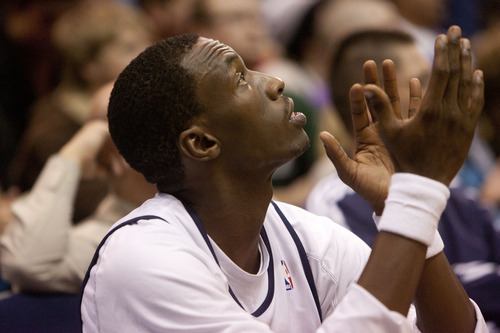This is an archived article that was published on sltrib.com in 2011, and information in the article may be outdated. It is provided only for personal research purposes and may not be reprinted.
So the Jazz want to win, huh?
While the signing of forward Josh Howard may seem out of character for the Miller family and the organization, it actually is a healthy development. The move suggests ownership understands that this is a professional sports franchise, and it is occasionally permissible for even the Jazz to act like one.
Not to dismiss Howard's mistakes of the past, but acquiring him hardly signals a return to the bad, old days of the Jazz in Utah. Misfits including Bernard King and Terry Furlow unintentionally made a lasting impact here. Their troubles led former coach and general manager Frank Layden and everybody else involved to recognize that choosing talent over character was not necessarily the way to build a successful franchise.
Part of that recognition, obviously, involved the fact that Utah is a different place — and happily so. This market demands a lot of its high-profile college and pro athletes, which is good.
Yet the fan base also is forgiving and seems to like winning. So there's nothing wrong with the Jazz's conforming to the rest of the world once in a while. If Howard comes with some baggage, including his endorsement of marijuana use in the offseason and charges of drag racing, the risk is worthwhile.
The Jazz have established enough of a culture of image consciousness and good behavior among their players that they can absorb someone with off-court issues such as Howard or point guard Jamaal Tinsley.
This is not a major, long-term move that can damage the franchise. At worst, Howard becomes a 66-game rental property, viewed as a failed experiment.
At best, the reward is considerable. If he's truly healthy after missing most of two seasons following a knee injury, he can give the Jazz the kind of dynamic, athletic small forward they've lacked since Andrei Kirilenko's long-ago, brief window of high performance.
If you're looking for a sign, this guy once scored 47 points — matching Kirilenko's jersey number — against A.K. and the Jazz in Dallas. Howard will be highly motivated to perform well and fit in here, because he's playing for his career at age 31.
In turn, Howard can accelerate the Jazz's rebuilding process without significantly slowing the growth of Gordon Hayward and other young players. Adding another offensive weapon gives coach Tyrone Corbin more chance to succeed in his first full season.
The Jazz need some edge, some swagger in the absence of Deron Williams, and that's what Howard brings. Without him, the Jazz were not close to becoming a playoff team this season. With him, that becomes a somewhat more realistic goal.
Howard's arrival is not a sign of desperation from the Jazz's ownership. It just tells me the Millers recognize they owe their fans the best product they can deliver this season, while also marketing a strategy for the future.
The Jazz are not selling their souls or lowering their standards to sign Howard, who has some history of positive community involvement, aside from his transgressions.
Howard will blend in well, on and off the court. That's his only choice, really. My guess is there will be less drama with Howard over the next four months than there was with Kirilenko in any recent season. There's great incentive for him to play along — which is exactly what the Jazz are in doing in bringing him to Utah.
The Jazz are trying to compete in the NBA; that's what we all expect of them, right? They're still doing it mostly their way, as befits this place. But if they have to act like everybody else sometimes, that's fine. It just means they can't always say they're different.
kkragthorpe@sltrib.comTwitter: @tribkurt



